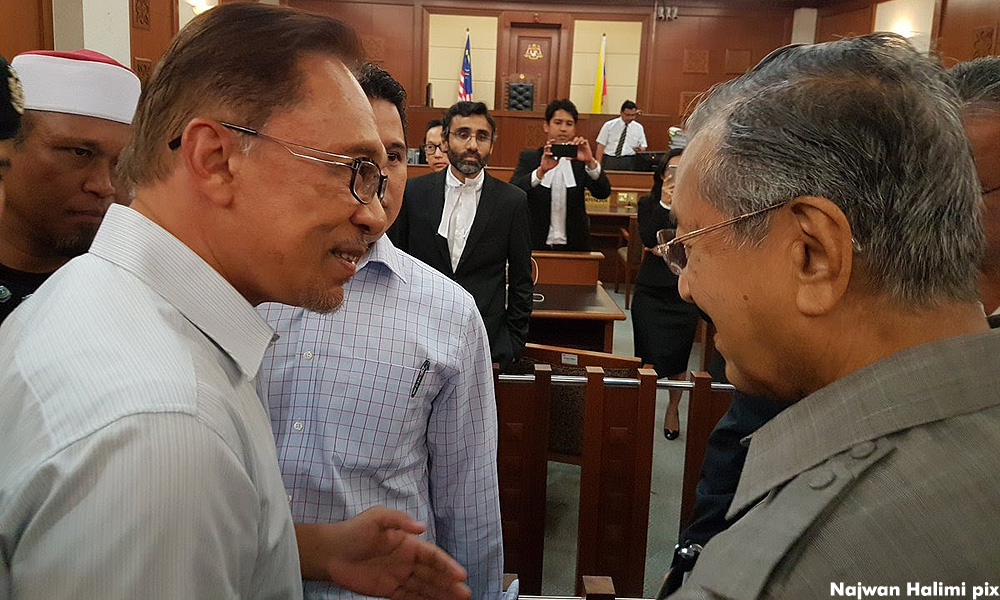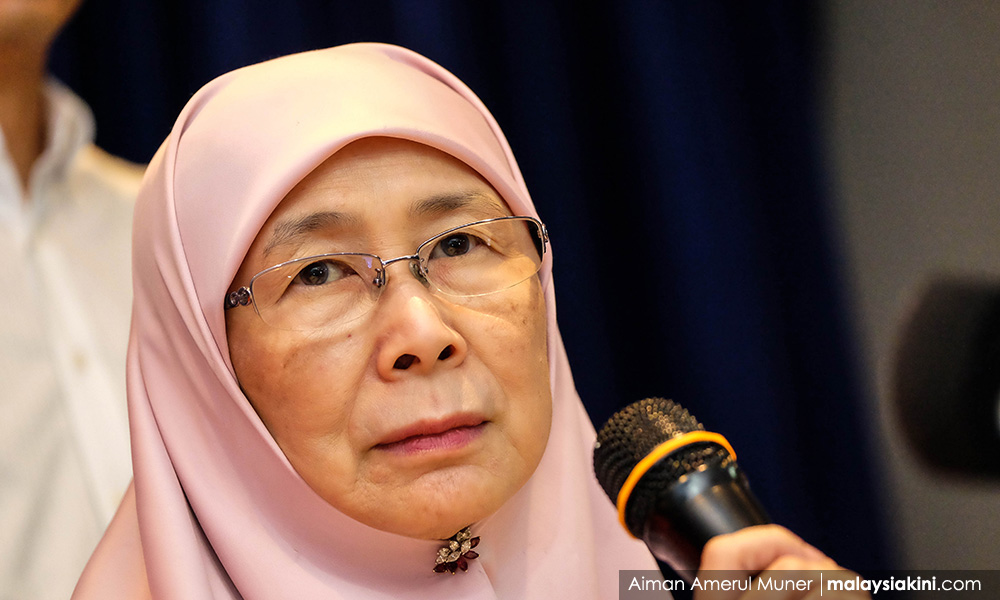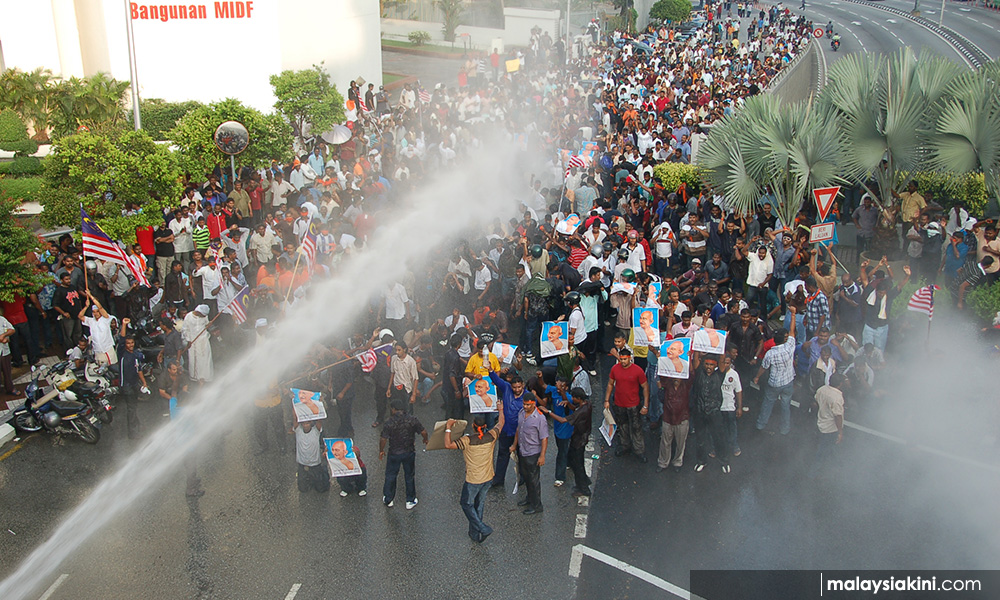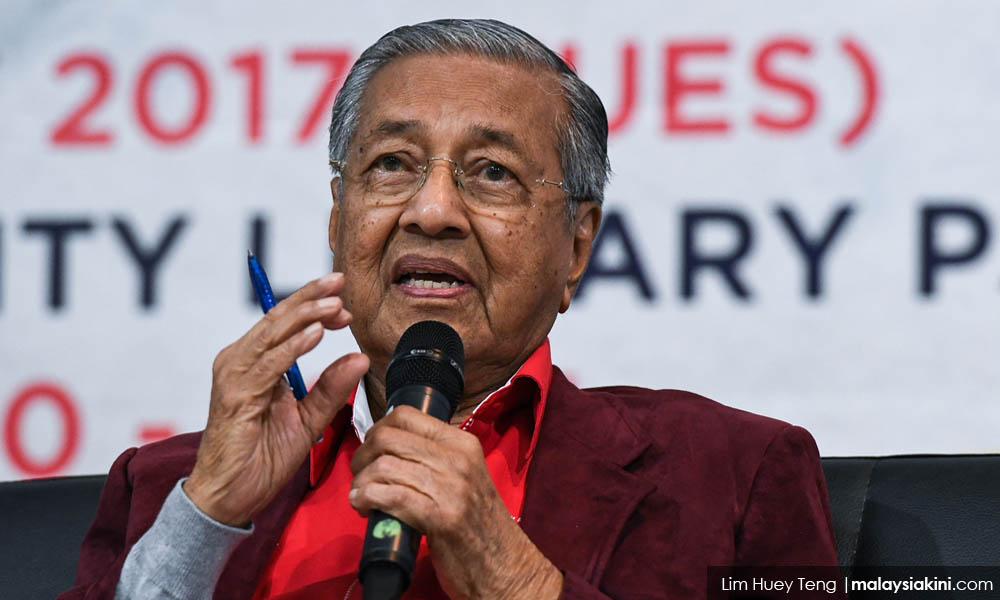
Over the now fast-fading year, two narratives have marked the politics of the opposition in Malaysia.
One is on the ostensible destroyer of constitutional government metamorphosing into improbable rescuer of the country from kleptocracy.
The other narrative is the man whose eyes have so long been firmly fixed on the main chance that the more it eludes him, the shakier his judgment of the paths by which to get there.
Critics who think Dr Mahathir Mohamad's credentials as a democratic reformer are bogus, slight an important strand in the Machiavellian approach to his political craft: the salutary sense of responsibility for what he has wrought prompts the Herculean effort to set right what has gone wrong, for which he has been hugely culpable.
On the other side of the opposition's narrative equation is this: Friends of Anwar Ibrahim, aware of the ambition that seethes within him, cannot seem to help him turn an obsession into irony.
That enterprise is always useful. In life, it is the great antidote to insomnia; in politics, it is the alternative to stalemate and sterility.
All this is prologue for the point that last weekend's pow-wow held by the opposition Pakatan Harapan to establish focal points for proceeding - such as who will be prime minister and who will be deputy should the coalition win an imminent general election (GE14) - was stymied for lack of consensus.

The reason: the Harapan presidential council's choice of Mahathir as PM and Dr Wan Azizah Wan Ismail as deputy should the coalition win GE14 was not assented to by the weekend's conclave because the gaoled Anwar has to approve it first.
So insisted the PKR complement at the weekend's durbar.
PKR's obduracy has had this ironic effect: their de facto leader who was the principal adhesive in the improbable opposition coalitions that had seminally denied the ruling BN its two-thirds parliamentary majority in 2008 (GE12) and bested BN in the popular vote in 2013 (GE13) has now mutated to become the main impediment to the coalition's progress.
This ironic development rendered the one-and-a-half day conclave sterile rather than what it should have been – decisive moment in the shaping of the Malaysian deliverance from the precipice to which 60 years of Umno-BN rule has conduced.
When seen against the backdrop of the Registrar of Societies' foot-dragging on recognising Harapan as a political entity and approving its logo, the outcome damages the standing of Sungai Buloh's most famous resident.
Prior to this, Anwar Ibrahim was the most consequential leader of the post-May 13, 1969 era of Malaysian history – on account of his ability to reshape the assumptions of the people has long aspired to lead.
Now, after last weekend's meeting, he appears to be churlish holder-up of the consensus that should have seen Harapan progress from the Mahathir-initiated Citizens' Declaration rejecting kleptocracy of March 2016, to the moment last weekend of a decisive coalescence of the forces ranged in support of urgent political reform.
In one of those ironies in which history abounds, this moment is the antithesis of that watershed one just over a decade ago when in a brilliant act of political divination, Anwar leveraged on an unexpectedly impactful event – the Hindraf organised march in Kuala Lumpur of bedraggled Indian Malaysians on Nov 25, 2007 – to steer the electorate to a seminal denial of BN's traditional supermajority in parliament.

How has this reversal come about?
A politician of Anwar's sensitivity has to be wading in a political river's currents rather than marooned on its banks to have a feel of a shifting public's pulse.
Incarcerated, he is abnormally dependent on what his cohorts tell him of what is happening beyond the walls of the prison.
Because PKR is a congeries of disparate political forces, different rapporteurs tell him different things.
If he had been out in the open air, his sensitive political antennae would pick up the important signals and act accordingly.
In prison, processing what he hears from others and filtering it through the distorting prism of his vaulting ambition, Anwar has become a weathercock, drifting on winds of circumstance.
That is the reason why he is sympathetic to a faction of PKR (factional strife in PKR is largely the result of his mishandling of rivalries within the party) which wants the 21 seats won by PAS in GE13 to be uncontested by Harapan, an issue that was raised over the weekend.
This is something that, if insisted upon, will result in PKR losing votes and may even eventuate in a DAP decision to go it alone in GE14.
The non-Muslim aversion to PAS is running at an all-time high and can turn against PKR if the party insists on cohabitation with what the "nons" see as bogus Islamists.
Attenuated from political realities, physically enfeebled by imprisonment, Anwar is out of sorts.
Meanwhile, battling age and infirmity, Mahathir is rising in the estimation of the leadership cohort of Harapan.

All of last week he was rumoured to be ill and in bed.
But when the weekend's deliberations began he rose to the occasion – to listen carefully, summarise succinctly what was said, render with clarity his take, and point the direction in which things should go.
It was as much a physical feat of endurance as it was a political tour de force.
Excepting an unenamoured few, all who watched and have been observing since the time of the Citizens' Declaration of March last year know that when push comes to shove, the denizen of Permatang Pauh cannot match the nonagenarian from Titi Gajah.
It appears that, as the great bard said, age cannot wither Mahathir nor the daunting challenges Harapan faces stale his resilience.
The narrative of national rescue, pace the weekend's cogitations at the Perdana Leadership Centre in Putrajaya, has recessed for Sungai Buloh to take things in.
Anwar risks more by stalling than by inaction caused by fear of being swept up by forces he can no longer control.
TERENCE NETTO has been a journalist for more than four decades. A sobering discovery has been that those who protest the loudest tend to replicate the faults they revile in others.- Mkini



No comments:
Post a Comment
Note: Only a member of this blog may post a comment.